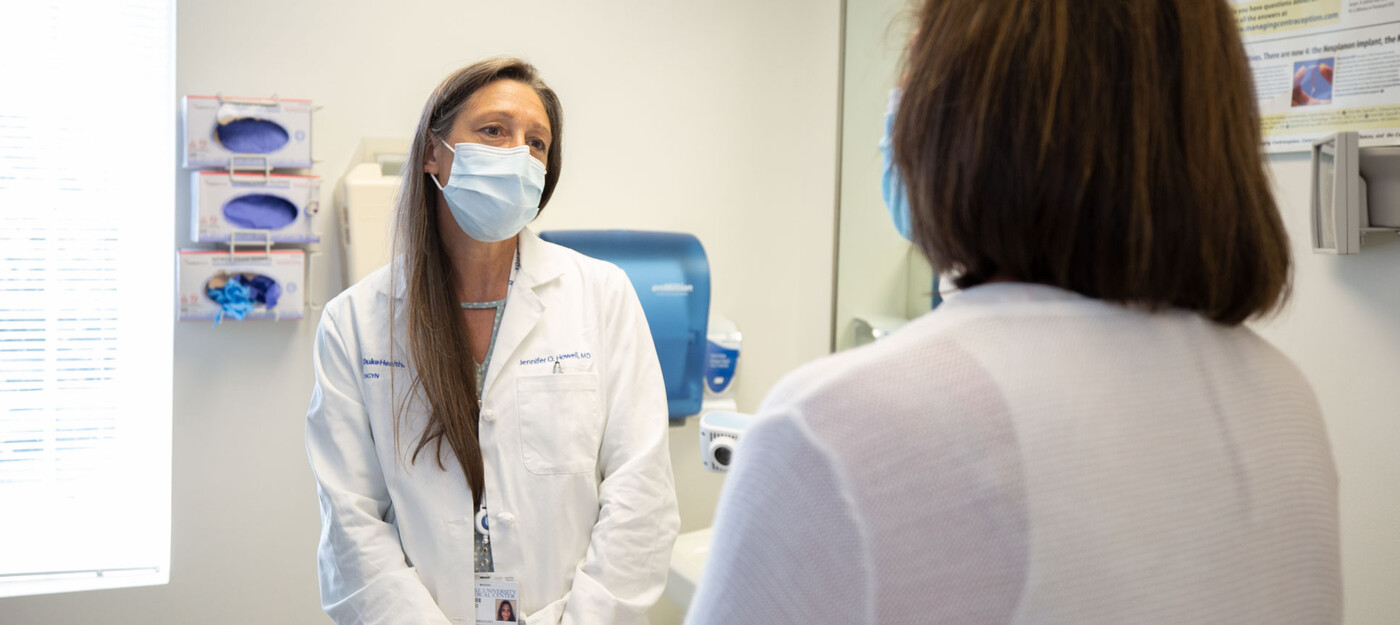Hot flashes, trouble sleeping, mood changes, irregular vaginal bleeding, and vaginal dryness are common symptoms of menopause, a time when women’s bodies no longer produce the hormone estrogen as they once did. While these symptoms don’t necessarily require medical treatment, they shouldn’t be ignored.
Menopause signals a time when you could be at higher risk for hypertension, cholesterol disorders, osteoporosis, and diabetes, said Dr. MargEva M. Cole, MD, a Duke Health certified menopause practitioner at Durham Obstetrics and Gynecology South Durham and North Duke Street
If you're struggling with menopause symptoms, your primary care provider or your obstetrician-gynecologist can help you and refer you to a menopause specialist when needed. Duke Health has gynecologists who specialize in providing care for women at this stage of life. They can help you stay healthy and feeling your best now and in the years ahead.
Talk to Your Doctor about Menopause: Most Women Don’t
More often than not, women see their primary care doctor for an annual checkup but don’t discuss menopause symptoms like night sweats or vaginal dryness because it could be an awkward conversation, or you might assume the symptoms will just go away. For some women, menopause symptoms will eventually end. However, talking to your doctor about your concerns is important because your doctor may recommend treatments that can help you find relief in the meantime. Or, they may suggest testing to confirm you aren’t dealing with a more serious concern.
If you’re uncomfortable talking with your doctor about these personal symptoms or you aren’t satisfied with your doctor’s answers to your questions about menopause, consider seeking out a menopause specialist. These ob-gyn providers bring an additional level of expertise to your care. The North American Menopause Society certifies menopause practitioners who have undergone advanced training, and Duke employs three of just 25 gynecologists in North Carolina with this menopause certification.
During your visit, our menopause specialists may ask questions to better understand how your menopause symptoms are affecting your quality of life. They will determine whether you may benefit from additional testing or treatment.
With this in mind, here’s a rundown of menopause symptoms that should be discussed with your doctor and how a certified menopause practitioner can help.
Hot Flashes
Hot flashes can range in intensity and last for years. They can be annoying and uncomfortable, or they may be a warning sign that you are at increased risk for a heart attack or stroke. The first step in your care is to manage your risk for heart disease. The second is to stop or reduce the hot flashes.
Low-dose hormone therapy can be effective in alleviating hot flashes but must be tailored for you. This is accomplished through a one-on-one discussion with your doctor, who will also explore your health history to thoroughly assess your health risks. Personalizing this treatment with guidance by a specialist is important, said Dr. Jennifer Howell, MD, a gynecologist and certified menopause practitioner who's been providing menopause care to women in the Triangle for more than 20 years. That's because many companies tout “anti-aging, bioidentical hormone therapy” that may not work. Duke certified menopause practitioners will recommend an FDA-approved hormone therapy if it is right for you. If estrogen isn’t appropriate, your doctor can recommend other medications to reduce hot flashes.
“It’s about the right therapy for the right person at the right time,” Howell said.
Mood Swings
Changes in your hormone levels can lead to mood swings, which can add stress to your daily life. The physical changes you experience during menopause can also be emotionally draining. This is normal, Dr. Cole said. Each person experiences menopause and its effects differently, she added. Often, changes in diet and exercise, and possibly anti-depressants and other medication, can make a difference in how you feel.
"My years of experience hearing stories from women about their menopausal symptoms have taught me to understand the importance of an individualized treatment plan,” Dr. Cole said.
Keeping a symptom diary is one way to explore connections between mood swings and menopause, Howell said. Tracking mood changes over several weeks can help your provider determine if the swings correspond with changes in your estrogen levels, or if other lifestyle changes are at play. "It may be that your moods are connected to your hormone levels, or it’s possible that social factors may be to blame," she said.
Menopause and Social Stressors that Impact Health
Many women experience menopause at a time in their life when a lot of changes are taking place. That’s why Dr. Howell takes time to understand a woman’s holistic needs. For example, changes in hormone levels may coincide with challenging emotional and social situations. Menopause can start right when women find themselves caring for aging parents or when the kids leave home. Financial needs may change, and other health problems related to aging can arise. These stressful situations are all separate yet can take place while coping with menopause symptoms.
"It's easy to think your well-being is impacted by your hormones being out of whack,” she said, “but there are many external factors for us to consider and treat."
Vaginal Dryness and Vaginal Bleeding
Estrogen provides lubrication. Without it, it’s common to experience dryer, thinner vaginal walls that can cause discomfort, pain during sex, and vaginal bleeding.
Irregular vaginal bleeding should be checked out by a specialist because in rare cases, it could be a sign of a more serious concern, including cancer. However, it’s more likely a result of vaginal dryness, and can be treated with prescription estrogen creams or noninvasive laser therapy. Your certified menopause practitioner can help you determine which treatment is best for you.
Concerns About Thyroid Disease
Menopause symptoms like hot flashes and mood swings can be confused with symptoms that signal thyroid disease, including hyperthyroidism (overactive thyroid) and hypothyroidism (underactive thyroid). Your doctor can determine the cause of your symptoms through testing. This care helps you manage your risk for more serious concerns related to thyroid disease including depression and heart disease.
Talk to Your Doctor
The bottom line, said Cole and Howell, is that you should talk to your doctor. Schedule a visit with your primary care provider or your obstetrician-gynecologist. When needed, they can refer you to a menopause specialist. You don’t and shouldn’t just live with menopause symptoms because you think they are harmless and an inconvenience with which you have to live.






